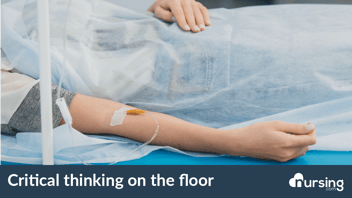Patients We Will Never Forget | NURSING.com

Audio: Welcome to the NRSNG podcast, providing those who care for the world with the tools and confidence they need. And here’s your host, Jon Haws.
Jon Haws: What’s up guys? Welcome to the NRSNG podcast. I’m here with Nicole-
Nicole: Hey guys.
Jon Haws: … and we just wanted to kind of talk to you guys today about some of the patients that we’ll never forget. I know a lot of you are in nursing school and maybe just starting to have patients. Some of you maybe are new nurses kind of getting those experiences, but maybe you’re so worried about the skills and everything that it’s hard to think about kind of the patients in less than a checkbox kind of way.
Nicole: Mm-hmm (affirmative).
Jon Haws: So we wanted to just share some of our experiences and let you guys know that you are gonna have these experiences, and you’re gonna have some of these patients that really kind of change the way you view nursing.
Nicole: For sure, and I’ll start with a non super emotional one so I don’t start crying right out of the gate. You know, these patients, they stick with you for so many different reasons. This one I wanted to share is one that stuck with me ’cause it taught me so much about myself as a nurse, and it gave me a lot to kind of go on.
So the patient was about 35 years old [inaudible 00:01:11]. I was working in a medical ICU, and he had come to us as a rapid response from the floor. His blood pressure was super, super low. It was like 60 over 40. He was still awake and alert, but really tired obviously ’cause his blood pressure was so low. We started working really hard, gave him lots of fluids. We put in a central line and we worked on this guy for probably three hours. Put in a central line, started vasopressors, and he was just you could tell he was getting more and more tired.
He was breathing heavy. It was kind of obvious that he was wearing out. And so the doctor said, “Hey, what if we go ahead and just intubate you under controlled conditions before it gets so bad. Let’s go ahead and we’ll put you to sleep, we’ll help support your breathing while we figure out what the heck is going on with you.” And the guy literally, like I said, he was fully awake. He was like, “Okay, yeah. That sounds great.” He was like, “Yeah, that’s fabulous. I’m exhausted. Put me to sleep, wake me up later.”
And so because it was this controlled setting, they decided to let the intern try.
Jon Haws: Yay. I know where this is going.
Nicole: So, I had probably been off orientation for maybe three months at this point, and I just kept thinking, this is taking too long. In my mind, I was like, this is taking too long. You know, they will give a sedative and a paralytic before they intubate, so the guy’s not breathing on his own at this point while we try to intubate. So they’ll bag him up and his SATS would come down to like 92, and I’d kind of say, “Oh, SATS are 92.” But I never really said like, “This is a problem.”
I did ask my charge nurse to call anesthesia, but I never said anything to the doctors. And at one point I looked up, his heart rate had been 110 and suddenly it was 55, and I knew at that point that he had lost his pulse. So we started CPR, worked on him for probably 30 plus minutes, and weren’t able to get him back, which was just gut wrenching to me ’cause this guy was awake-
Jon Haws: I thought you weren’t gonna tell an emotional story.
Nicole: … well, but what I learned … I mean, it was really hard. But, what I learned was how important it is to speak up and advocate for your patients. And the words I usually teach my students to use, and this is good words for you guys, is I’m uncomfortable with this. I’m uncomfortable, stop. This isn’t right. This doesn’t feel right. Or it’s time to stop. Something like that. You have to advocate for your patients.
I was afraid of speaking up because I was so new that I don’t feel like I advocated well enough for my patient.
Jon Haws: It can be really scary ’cause in hospitals there’s a lot of strong personalities. I mean, we talked about how nurses can be Type A personalities, well so can physicians. I mean, they know that they’re gonna be fully responsible for things that go wrong and stuff like that, so they’re Type A as well, and when you get all those people together, it can be scary to speak up. And even with … and there are good interns, obviously, but even with interns it can be scary because they’re supposed to be learning and you’re supposed to be learning, and it’s a scary environment.
Nicole: And sometimes the interns aren’t even willing to speak up and say when they’re uncomfortable. They just keep doing what they’re told.
Jon Haws: Yeah ’cause like if the attending realize I don’t know what I’m doing, then I’m gonna get a bad score or whatever.
Nicole: Yeah.
Jon Haws: Wow. Yeah. So, I think that’s a great lesson to take away, ’cause even as a student you can do this-
Nicole: Yes.
Jon Haws: … and I think the tip Nicole gave is really good. It’s not saying you’re wrong, it’s saying, look, this doesn’t seem right. Is anybody else okay checking on this, maybe somebody that knows a little more or something?
Nicole: Yeah, don’t be afraid to ask for help.
Jon Haws: Yeah. My story is just … I have a lot of stories. I’ve told a lot of them, but one of the stories that I remember, it’s just kind of a cute little story. But I’ll remember this guy forever, and his wife.
I worked in neuro ICU. I was pretty new out of internship and all that stuff, and it was near Christmastime. This lady came in with a stroke, just an Ischemic stroke, but everything kind of turned out pretty well for her, and she just did not realize that she had had a stroke … like she was ready to go. She just wanted to get out of bed, get up, and it wasn’t like a confused way, it was like she just-
Nicole: She wanted to go.
Jon Haws: … she was feeling good. She was happy and feeling good. And you go in there, and her husband was in there every single day in the little recliner in the corner, just kind of writing away. He was just writing stuff. I don’t know what was going on. But they were super nice. Every time you’d go in there they would talk to you and they would just … And I was nighttime, but they would wake up every time and be like, “Hey Jon, how’s it going,” you know, and just talk.
The husband the whole time’s just kinda over there writing. I took care of them a couple days, and at the end of my second shift, right before I was about to go home, and again, it was close to Christmas and stuff, he reached down into his bag of all the stuff he’d been writing and he pulled out a Christmas card. And it was a personalized Christmas card. It was, “Dear Jon-“
Nicole: Oh my gosh.
Jon Haws: … “Thanks so much for taking care of my wife. We’ll never forget you…” those kinds of things. And so I still have that Christmas card actually in my nightstand, and it was just a really cute … They were the ones going through the trauma, going through the hard time, and I was the one just doing my job, you know, checking boxes-
Nicole: That’s so sweet.
Jon Haws: … and they took a minute to say thanks for taking care of us. And he wrote cards for housekeeping, he wrote cards for everybody. He was just writing away.
Nicole: Oh my gosh. That’s the best.
Jon Haws: Yeah. Every single person that stepped in the room, there was a personalized card for. And it was just super cute.
Nicole: That’s so sweet.
Jon Haws: Yeah, just those patients that … I mean, this is a hard job, and I think most patients recognize that, but like he just completely … They weren’t even thinking about themselves in that really, really bad time.
Nicole: Right. That’s so fun.
Jon Haws: Yeah.
Nicole: I do feel like now I’m thinking of my other stories. I’m like, gosh, they’re all really like awful.
Jon Haws: Most of them are awful.
Nicole: But I worked in ICU for nine years. I mean, a lot of your stories are … One of them actually was … this one ends good.
So I had a patient who was very, very, very, very sick. He had an alveolar hemorrhage. He was actually bleeding from the inside of his lungs. And we ended up doing some really cool stuff with him where we-
Jon Haws: What do you even do with that?
Nicole: … We did a bifurcated ET tube, and we ventilated just one lung.
Jon Haws: Oh. Oh, that’s cool.
Nicole: And we were able to close off airflow to the other ’cause we didn’t want to cause more trauma. It was actually some of the coolest things I’d ever done. It was the most complicated patient. He ended up on dialysis, like CRRT, the slow dialysis in ICU. He was extremely ill, and for probably two weeks, he had SATS in the mid 80s, low 80s.
And I mean, I had this guy for eight shifts in a row, and when you only work three shifts a week, you realize that eight shifts in a row is-
Jon Haws: A long time.
Nicole: … is a long time. So, I had built a really strong relationship with the family. We had had lots of conversations about how sick their dad was. They just did not … there was religious convictions, but also they just didn’t want to let him go. They didn’t feel like it was right, and I didn’t feel like it was right because he was still acutely ill. He wasn’t in a point where he was just kind of level-
Jon Haws: Going down, yeah.
Nicole: … or going down. He was kind of at this just, I’m very ill, but I’m not dying state.
Jon Haws: He wasn’t gonna … yeah.
Nicole: And I just remember the doctor literally told me, “You should go tell the family that they should withdraw care.” And I was like, “Uh, I’m not gonna do that.”
Jon Haws: That’s your job.
Nicole: I was like, “No.” And I told him what I just said. I felt like he’s still acutely ill. I feel like we need to get him over that first and see what happens. So then, I left to go on vacation for three weeks. The whole time … Like, I cared so much about this guy and no one else apparently cared, because the whole time, I’m texting my friends from work like, “Hey, how’s bed five doing?”
Jon Haws: Yeah.
Nicole: And I get back, and I walk in, and this guy is sitting up in his bed. He is trached, he is awake, he’s talking to his family, and I almost cried, because I just thought, like what if we had withdrawn care?
Jon Haws: Right, Dad’s gone-
Nicole: What if we had given up on him and now here he is, he’s fine … I mean, he’s trached and he has a long road ahead of him, but I was just like … I don’t know. It was nice. It was nice to know that that three weeks worth of work was for something.
Jon Haws: Yeah. And I had thought of another patient we had that was kind of the same way that … and every patient’s different, every story’s different, everything’s always different, but some just … whether they’re fighting harder or whether their condition’s totally different, like they just go and go and go and go, and it’s like, we just keep doing stuff to these people and it’s like, you get them over one infection, then you have to re-intubate them. Then they have some other sort of … then they have a PE or something.
Nicole: Mm-hmm (affirmative).
Jon Haws: And it’s like you just keep going and going and going, and they just keep bouncing back. And it is really cool to see those patients, that it’s like, they’re still here?
Nicole: They’re still-
Jon Haws: And then they get to go to step down, and then they get to go to a nursing home, and then you find out later that they made it home and they’re walking and all that stuff.
Nicole: Yeah. And he had actually come back to … I saw him in the ER like a month and a half later. He came back for some complication with this trache, but he was walking around and he was fine. It was really cool.
Jon Haws: I think a lot of times, especially like in ICU, we can … ‘Cause I remember talking to some of the neurosurgeons, I’m like, I was telling one of the neurosurgeons I worked with like, none of these stories ever turn out okay, ’cause that’s all I saw was my short time with these people. Like you take a bone flap out and the guy is not moving. But he’s like, “No dude, that guy walked into my office two weeks ago-“
Nicole: That guy went home. Yeah yeah, yeah.
Jon Haws: It’s like, are you serious?
Nicole: That’s the cool part.
Jon Haws: We don’t get to see that part a lot of times, but patients definitely stick out and they definitely change your life. And I think Nicole and I definitely have much more emotional patients that have adjusted the way we view life and treat people, but those stories are too emotional-
Nicole: You have funny stories too though.
Jon Haws: We have funny stories too.
Nicole: Do you remember the woman who pulled her art-line out?
Jon Haws: Yes I do.
Nicole: When I was orienting in the neuro ICU, we had a patient who was very confused, and I walked in the room and there was a puddle of blood because she had pulled her art-line out.
Jon Haws: And like, she didn’t even need the art-line, it was fine, like she was fine, but it was the lady that you have to sit next to to chart all night ’cause she’s gonna be doing-
Nicole: Something.
Jon Haws: … she’s creating mischief all night.
Nicole: It was fun.
Jon Haws: So we were mopping up blood. But she turned out fine.
Nicole: She’s fine.
Jon Haws: Yes.
Nicole: Yeah. She’s great.
Jon Haws: We went in to the doctor and we’re like, “So, the art-line’s gone.”
Nicole: It’s gone.
Jon Haws: We DC’d it early.
So, anyway guys, start collecting these stories ’cause as you build these stories for yourself, it’s gonna define I think who you are as a nurse.
Nicole: It does. It changes the way you perceive your patients and move forward with your care. It’s really … get a little notebook. Write them down.
Jon Haws: Yeah.
Nicole: Keep track.
Jon Haws: I did, every time I … I actually have a little storage pile where I kind of was keeping notes. Not notes, not notes, but like the patients I really wanted to remember, I had little notepad in my phone that it was like, “This patient who this, this patient who this,” and kind of stored up those stories, and then every time I got a note from a patient or a letter, I kind of kept them in my-
Nicole: Yeah, I’d keep all of mine.
Jon Haws: Yeah.
Nicole: Yeah.
Jon Haws: So, if you guys have stories you want to share with us, please just email them to us at contact NRSNG. We’d love to hear your stories too, and just know how it’s impacted your life.
Nicole: Yeah, for sure.
Jon Haws: So, with that, guys, go out and be your best selves today.
Nicole: Happy nursing.
Jon Haws: Happy nursing.


.png?width=50&height=50&name=stencil.amz%20(3).png)





